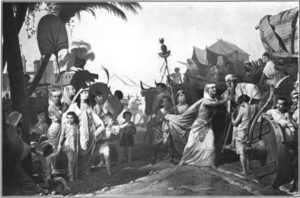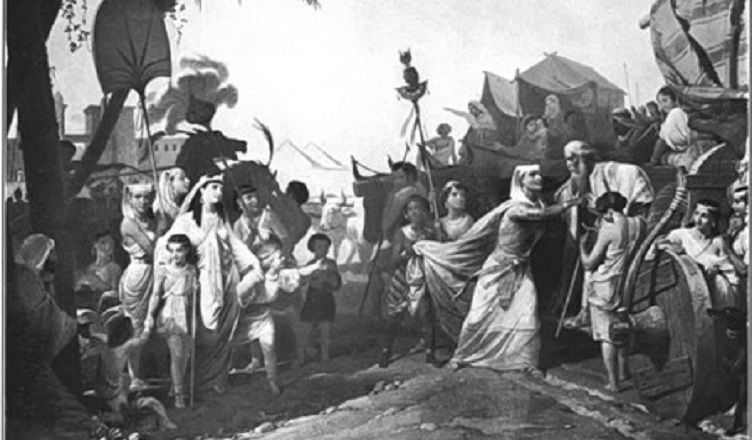From Genesis 46-47
 Jacob is on his way to Egypt to be reunited with his long lost son Joseph. Its a significant event in his life and marks a new era for his family. A genealogy is listed, giving a count of the number of people who come to Egypt. Seventy. Its a special number which reminds the readers that all Israel went to Egypt. It carries the implication the LORD is ordering events so he can fulfill his promises.
Jacob is on his way to Egypt to be reunited with his long lost son Joseph. Its a significant event in his life and marks a new era for his family. A genealogy is listed, giving a count of the number of people who come to Egypt. Seventy. Its a special number which reminds the readers that all Israel went to Egypt. It carries the implication the LORD is ordering events so he can fulfill his promises.
This post is part of my bible in a year series.
Passage and Comments

The story of Joseph is near its end. He has revealed himself to his brothers and they have been reunited. The brothers return home and convince Jacob his father he is not dead. He agrees to return with them to Egypt. Jacob takes everything he has. Then we are given a genealogy.
The genealogy is significant for several reasons.
8 Now these are the names of the descendants of Israel, who came into Egypt, Jacob and his sons. Reuben, Jacob’s firstborn,
9 and the sons of Reuben: Hanoch, Pallu, Hezron, and Carmi.
10 The sons of Simeon: Jemuel, Jamin, Ohad, Jachin, Zohar, and Shaul, the son of a Canaanite woman.
11 The sons of Levi: Gershon, Kohath, and Merari.
12 The sons of Judah: Er, Onan, Shelah, Perez, and Zerah (but Er and Onan died in the land of Canaan); and the sons of Perez were Hezron and Hamul.
13 The sons of Issachar: Tola, Puvah, Yob, and Shimron.
14 The sons of Zebulun: Sered, Elon, and Jahleel. (Gen 46.8-14)
Jacob is named Israel. It gives a hint to the significance of the genealogy.
The author of Genesis lists the families of his sons in birth order. Note he also includes people who have died (e.g. Er, Onan).
15 These are the sons of Leah, whom she bore to Jacob in Paddan-aram, together with his daughter Dinah; altogether his sons and his daughters numbered thirty-three.
16 The sons of Gad: Ziphion, Haggi, Shuni, Ezbon, Eri, Arodi, and Areli.
17 The sons of Asher: Imnah, Ishvah, Ishvi, Beriah, with Serah their sister. And the sons of Beriah: Heber and Malchiel.
18 These are the sons of Zilpah, whom Laban gave to Leah his daughter; and these she bore to Jacob—sixteen persons. (Gen 46.15-18)
The next set of descendants come from Leah. His first wife given to him by trickery by Laban. Note even Leah’s servant Zilpah is mentioned. Leah gave Zilpah to Jacob in order to claim more sons for herself.
19 The sons of Rachel, Jacob’s wife: Joseph and Benjamin.
20 And to Joseph in the land of Egypt were born Manasseh and Ephraim, whom Asenath, the daughter of Potiphera the priest of On, bore to him.
21 And the sons of Benjamin: Bela, Becher, Ashbel, Gera, Naaman, Ehi, Rosh, Muppim, Huppim, and Ard.
22 These are the sons of Rachel, who were born to Jacob—fourteen persons in all.
23 The son of Dan: Hushim.
24 The sons of Naphtali: Jahzeel, Guni, Jezer, and Shillem.
25 These are the sons of Bilhah, whom Laban gave to Rachel his daughter, and these she bore to Jacob—seven persons in all. (Gen 46.19-23)
Rachel is the wife he worked for Laban fourteen years for. Her sons are listed in this second set. Like the first set. Rachel’s servant Bilhah is mentioned because she also was given to Jacob as a wife so Rachel could claim her sons for her own.
26 All the persons belonging to Jacob who came into Egypt, who were his own descendants, not including Jacob’s sons’ wives, were sixty-six persons in all. 27 And the sons of Joseph, who were born to him in Egypt, were two. All the persons of the house of Jacob who came into Egypt were seventy. (Gen 46.26-27)
Two numbers are given. Sixty six and seventy.
Story of Israel

The list of Jacob’s descendants names seventy people who went down to Egypt with him. Seventy is also the total number of nations listed as descendants of Noah in ch. 10, so seventy had some symbolic significance in Bible times.
This is confirmed by a careful reading of 46:8–27, which shows the author’s keenness to make the total come to seventy. It looks as though he had a list of seventy descendants of Jacob, but then he realized that not all of them entered Egypt (e.g., Er and Onan; v. 12), or that some were born in Egypt (e.g., Manasseh and Ephraim; v. 20).
Strictly speaking, just sixty-six descendants went down with Jacob, but if Dinah is added as well as Joseph and his sons, the total reaches seventy (vv. 26–27).
[One scholar] has suggested that seventy represents totality: it expresses the idea that all Israel went down to Egypt. It also shows how the promise of a multitude of descendants, first made to Abraham (12:2), is progressing toward fulfillment.
The first readers of Genesis would have recognized these names, not simply as the names of their ancestors but as names of tribes and clans, so to them the fulfillment of the promise would have been even more apparent. (Wenham, G. J. (2003). Genesis. In J. D. G. Dunn & J. W. Rogerson (Eds.), Eerdmans Commentary on the Bible (p. 69). Grand Rapids, MI; Cambridge, U.K.: William B. Eerdmans Publishing Company.)
Story of Jesus
After the genealogy is recorded the number seventy is listed as the number of those who come to Egypt. This number is significant for the Hebrews because it represents all Israel. And they have gone to Egypt. We know there the LORD will fulfill his promises and bring them out of Egypt (and slavery) and into the promised land.
The gospels according to Matthew and Luke both have the genealogies of Jesus Christ.
1 The book of the genealogy of Jesus Christ, the son of David, the son of Abraham. …
17 So all the generations from Abraham to David were fourteen generations, and from David to the deportation to Babylon fourteen generations, and from the deportation to Babylon to the Christ fourteen generations. (Mt 1:1,17)
Fourteen is the special number here. The author of Matthew has constructed a genealogy explicitly said (the last has thirteen) to contain three groups of fourteen ancestors extending from Abraham to Jesus. The reason for groups of fourteen is not clear. But, the Hebrew letters of the name “David” (dwd) have the numerical value fourteen, which fits Matthew’s emphasis on David and highlights Jesus claim to being the promised David messiah. Fourteen – Jesus is the Christ.
Both numbers, fourteen and seventy, are used to highlight the LORD is faithful to his promises. He is trustworthy.
Copyright © Joshua Washington and thescripturesays, 2016. All Rights Reserved.





